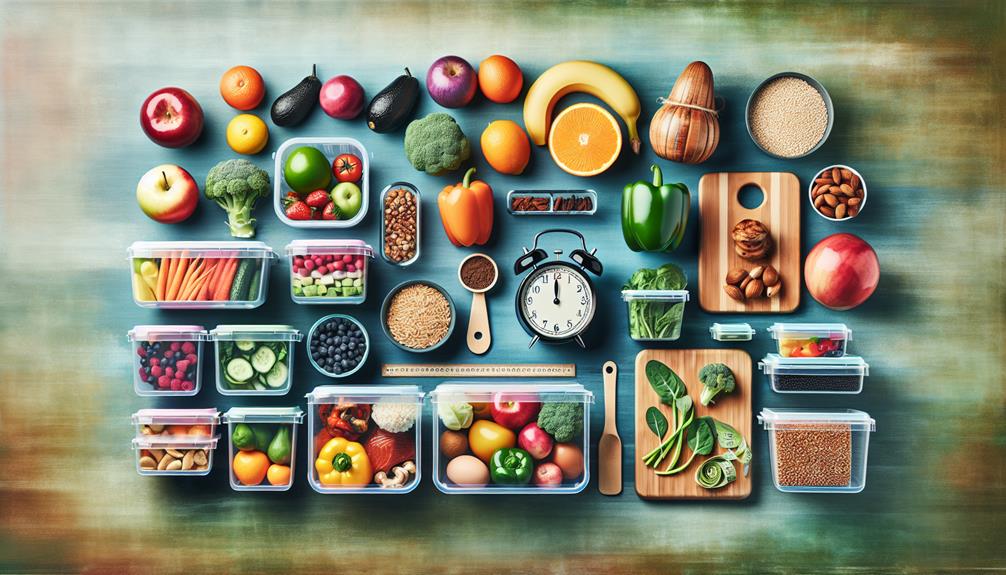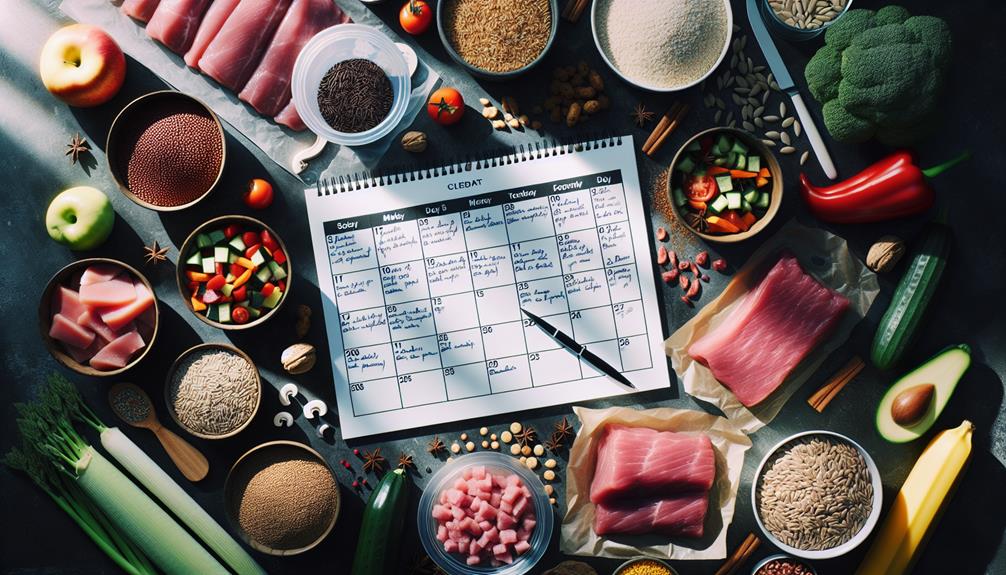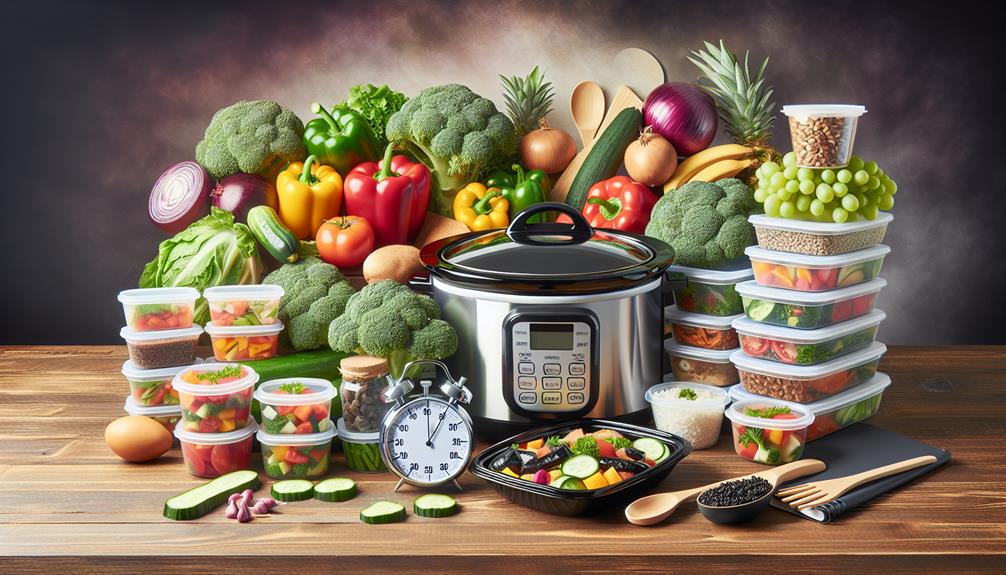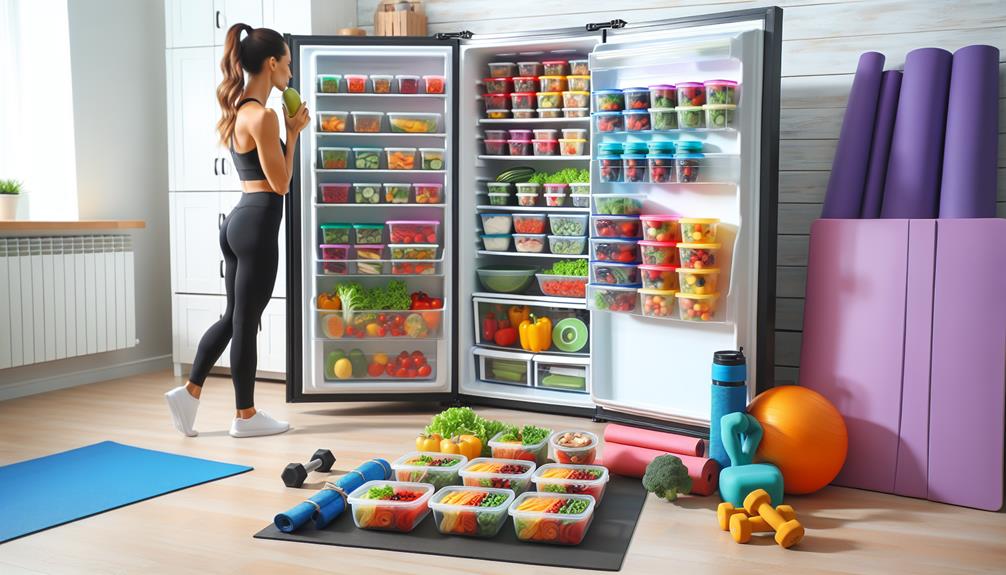
As a fitness enthusiast, mastering meal prepping can offer precision in nutrition control, save time, and bolster your fitness goals. Start by planning menus around nutrient-dense foods like colorful veggies, lean proteins, and whole grains. Opt for efficient cooking methods such as grilling and roasting to enhance flavors while preserving nutrients. Don't underestimate the importance of appropriate storage and portion control to maintain balance in your diet. Soon, with the right ingredients and techniques, even your meal prep will become an enjoyable part of your healthy lifestyle. Stick around, there are plenty more insights and tips to uncover.
Understanding the Basics of Meal Prep

Diving into the world of meal prep, you must first understand its basic principles, which involve planning and preparing your meals in advance to maintain a healthy diet and support your fitness goals. It's not just about cooking a week's worth of meals on a Sunday afternoon; it's about smartly strategizing your menu to optimize nutrient intake and minimize time spent in the kitchen.
Firstly, you've got to get organized. You'll need to plan your meals for the week ahead, taking into account your dietary needs and fitness regimen.
Next up is shopping; armed with your meal plan, you'll purchase the ingredients you need, choosing fresh and wholesome produce to guarantee optimal nutrition.
Then, it's time to cook. Batch cooking is your friend here. You'll cook large quantities of your chosen recipes, portioning them out into individual meals.
Importance of Meal Prepping for Fitness
Now that you've grasped the basics of meal prepping, let's explore why this practice is such a game-changer for fitness enthusiasts. Meal prepping isn't just a trendy lifestyle habit; it's an innovative strategy to maintain a healthy diet, fuel intense workouts, and achieve fitness goals more efficiently.
It's pivotal for fitness enthusiasts because it allows for precise control over your nutrition. You're not just eating randomly; you're consuming what your body needs, when it needs it. This makes it easier to balance your macronutrients, ensuring you get the right mix of proteins, carbs, and fats.
Moreover, meal prepping helps in eliminating unhealthy food choices. With meals ready to go, you're less likely to succumb to the temptation of quick, unhealthy snacks or fast food.
Time is another critical factor. Preparing your meals ahead reduces the time spent on daily cooking and cleaning. You'll have more time to dedicate to your fitness routine.
Lastly, it supports consistency. Consistent, healthy eating is key to reaching and maintaining your fitness goals. With meals prepped in advance, you'll keep your diet on track, even on your busiest days.
Meal prepping is an innovative approach to fitness nutrition; it's time to embrace it.
Planning Your Weekly Meal Prep

Planning your weekly meal prep can greatly streamline your fitness journey.
First, you'll need to choose nutrient-dense foods that fuel your workouts efficiently.
Then, adopting effective cooking techniques and mastering the art of storage and portion control can optimize your meal prep efforts.
Selecting Nutrient-Dense Foods
When it comes to planning your weekly meal prep, selecting nutrient-dense foods is an essential step that can greatly enhance your fitness results. Nutrient-dense foods are those that contain a high amount of nutrients relative to their calorie content. They're typically packed with vitamins, minerals, complex carbohydrates, lean protein, and healthy fats, providing you with the fuel you need to conquer your workouts and recover effectively.
So, how do you incorporate these powerhouses into your meal plan? Start by filling half of your plate with colorful vegetables. They're not only low in calories but also rich in essential vitamins and minerals.
Next, incorporate lean proteins like chicken, turkey, or tofu. These will help to build and repair your muscles after strenuous workouts.
Don't overlook whole grains either – quinoa, brown rice, or whole grain bread are excellent sources of complex carbohydrates that will keep your energy levels steady.
Lastly, don't forget healthy fats from avocados, nuts, and seeds. They'll help you feel satisfied and provide essential fatty acids necessary for overall health.
Efficient Cooking Techniques
Having chosen your nutrient-dense foods, it's time to master some efficient cooking techniques that will streamline your weekly meal prep. Grilling, roasting, and steam-cooking are just a few techniques that can effectively prepare your meals while preserving the nutrients in your food.
Grilling is a great way to add flavor to your food without adding extra calories. Roasting allows you to cook multiple meals at once, saving you time throughout the week. Steam-cooking, on the other hand, is a gentle method that maintains the nutritional value of your food.
Consider the following table for a quick guide on how to efficiently use these cooking techniques:
| Technique | Tips |
|---|---|
| Grilling | Use lean meats, and marinate for flavor |
| Roasting | Cook large batches of vegetables at once |
| Steaming | Preserve nutrients by avoiding overcooking |
| Slow-Cooking | Prepare meals in bulk with minimal effort |
| One-Pot Cooking | Save time and reduce cleaning |
Storage and Portion Control
After mastering your cooking techniques, it's crucial to focus on proper storage and portion control for your meals, guaranteeing your hard work doesn't go to waste and you're consuming the right amount of nutrients every time. Innovative kitchenware like portion control containers, food scales, and vacuum seal bags can be game-changers.
Portion control containers are a straightforward way to measure out your meals, helping you maintain a balanced diet. Using a food scale is another brilliant method to make sure you're eating the correct amount of each food group. It's accurate, easy to use, and takes the guesswork out of portioning.
Vacuum seal bags, on the other hand, extend the shelf-life of your meals, preserving their freshness and nutritional content. Furthermore, proper storage shouldn't be overlooked. Storing meals in airtight containers in the refrigerator or freezer keeps them fresh and prevents cross-contamination.
Choosing the Right Ingredients
Selection of the right ingredients plays a significant role in your meal prep journey, offering the perfect balance of nutrition and taste. It's important to be innovative, seek out fresh, high-quality ingredients that align not only with your fitness goals but also your palate.
Consider incorporating a variety of proteins, vegetables, and complex carbohydrates into your meals. Here's a simple table to get you started:
| Ingredient Type | Examples | Why it's important |
|---|---|---|
| Protein | Chicken, fish, tofu | Essential for muscle recovery and growth |
| Vegetables | Broccoli, spinach, bell peppers | Packed with vitamins and minerals |
| Carbohydrates | Brown rice, sweet potatoes, quinoa | Provide sustained energy and keep you full |
Remember, you're not limited to these options. Keep exploring and diversifying your ingredients – it's essential for maintaining interest in your diet and ensuring a broad spectrum of nutrients.
While purchasing, pay attention to the quality. Opt for organic, locally-sourced ingredients whenever possible to maximize the nutritional value. Be mindful of your dietary needs and allergies when selecting ingredients. Your meal prep shouldn't just be efficient; it should also be tailored to your unique requirements.
Efficient Cooking Techniques for Meal Prep

Now that you've selected the right ingredients, let's focus on efficient cooking techniques for meal prep.
You'll discover time-saving kitchen hacks that don't compromise the nutritional value of your meals.
We'll also explore nutrient-rich cooking methods that can enhance your fitness journey.
Time-Saving Kitchen Hacks
To boost your efficiency in the kitchen during meal prep, consider these time-saving hacks that can greatly streamline your cooking process.
Firstly, embrace batch cooking. Prepare large quantities of a particular dish, then portion and freeze for future meals. This reduces cooking time overall, allowing you to stay focused on your fitness goals.
Next, invest in multitasking kitchen gadgets. High-tech blenders can puree and heat soup, while food processors can chop, slice, and grate in seconds. This not only saves time but also minimizes clean-up.
Thirdly, pre-chop vegetables and store them in the fridge. Spending a little time doing this at the start of the week can save you precious minutes each day.
Lastly, utilize the 'mise en place' technique. Gather and prep all your ingredients before you start cooking. This guarantees you're not wasting time rummaging through the pantry or fridge mid-cook.
Nutrient-Rich Cooking Methods
After mastering time-saving kitchen hacks, it is crucial to shift your focus to nutrient-rich cooking methods that optimize the health benefits of your meal prep. These methods leverage innovative culinary techniques to preserve the nutritional value of your ingredients while enhancing their flavor.
Here's a table summarizing three efficient cooking techniques for your reference:
| Technique | Benefits | Example |
|---|---|---|
| Steaming | Preserves nutrients, No added fat | Steamed broccoli |
| Grilling | Low fat, Enhanced flavor | Grilled chicken |
| Sautéing | Quick, Retains nutrients | Sautéed spinach |
Steaming is a top choice for preserving nutrients in vegetables like broccoli. Grilling is another healthy option, allowing you to cook meats like chicken with minimal fat and maximum flavor. Lastly, sautéing is a quick and efficient method that retains the nutrients in foods like spinach.
Meal Prep Recipes for Fitness Enthusiasts
Harnessing the power of meal prep can elevate your fitness journey, and we're here to share some delectable, nutrient-packed recipes tailored specifically for fitness enthusiasts like you.
First off, let's focus on breakfast, the meal that kickstarts your metabolism. Try a protein-rich Greek yogurt parfait with mixed berries, chia seeds, and a scoop of protein powder. It's an invigorating, tasty way to fuel up for the day, and it's quick to prepare.
For lunch, consider a quinoa and grilled chicken salad. Quinoa is a complete protein, and chicken is lean, making this combination a powerhouse for muscle repair and growth. Add colorful veggies for an antioxidant boost and a light vinaigrette to enhance flavor.
Dinner could be a spiced salmon fillet with sweet potatoes and steamed broccoli. Salmon is a great source of Omega-3 fatty acids, which aids in muscle recovery. Sweet potatoes provide complex carbohydrates for energy, while broccoli adds fiber.
Don't forget about snacks! A handful of almonds or a protein shake can stave off hunger between meals and support muscle growth.
These recipes not only taste great but are also easy to prepare and packed with the nutrients you need to reach your fitness goals.
Storing and Organizing Your Meals

Once you've prepared your meals, it's essential to store and organize them properly to preserve their freshness and guarantee easy access throughout the week. This step is as significant as the preparation itself.
Invest in high-quality, reusable food containers that are BPA-free and microwave safe. Glass containers are a sustainable choice, with the added benefit of being stain and odor-resistant. They also allow you to visually identify your meals, saving you precious time.
Plan your fridge space wisely. Keep your meals in the middle section where the temperature is most stable. Organize them in the order you'll consume them, placing the meals for the first part of the week at the front.
Label your containers with the contents and the date of preparation. This not only helps you track your meal schedule but also ensures you consume your meals at their peak freshness.
Last but not least, consider a meal prep bag. These innovative bags have compartments designed to hold your containers, making transportation easy and keeping your meals cool.
Follow these storage and organization tips to make your meal prep journey seamless and efficient. Your fitness goals are just a well-organized fridge away!
Frequently Asked Questions
Can I Meal Prep if I Have Dietary Restrictions or Allergies?
You can conquer meal prep even with dietary restrictions or allergies. It's all about tailoring your meal plan to your needs. Research, innovative recipes, and careful planning are your best allies here.
How Do I Adjust Meal Prep for Weight Loss or Muscle Gain?
Sure, you can adjust meal prep for weight loss or muscle gain. You'll need to calculate your caloric needs, then plan meals accordingly. For weight loss, aim for a deficit; for muscle gain, a surplus.
Are There Budget-Friendly Options for Meal Prepping?
Like a well-planned workout, meal prepping on a budget's no sweat. You've to focus on staple items like rice, beans or chicken. Buying in bulk, planning meals, using in-season produce also saves money.
What Are Some Tips for Meal Prepping During Holidays or Vacations?
You can prep meals during holidays or vacations by choosing simple, easy-to-cook recipes. Consider portable, non-perishable snacks. Plan ahead, use local produce, and don't forget to balance indulgence with healthy choices.
How Can I Incorporate Cheat Days Into My Meal Prep Plan?
Managing cheat days can feel like walking a tightrope. You can pencil them into your meal prep plan but remember, it's about balance. Indulge in your favorites moderately and supplement with healthy choices.



